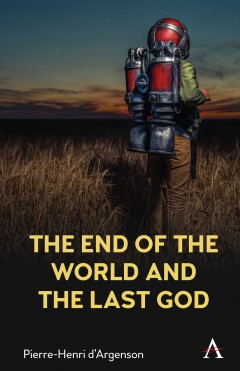The End of the World and the Last God
By Pierre-Henri d’Argenson
Translated by M. James Christie
Other Formats Available:
E-Book- About This Book
- Reviews
- Author Information
- Series
- Table of Contents
- Links
- Podcasts
About This Book
After years of relative indifference, space exploration has caught the public’s imagination once again. However, this enthusiasm may well hide a disturbing question: what if humankind is in fact bored with life on Earth? The end of the world has indeed arrived, but in an unexpected way. It can be described thus: man’s potential on Earth has been exhausted. We have discovered every piece of land, tried all sorts of political regimes, experienced all the forms of the arts and committed ourselves to all kinds of religious beliefs. Yet if we admit that the thirst for exploration and novelty is at the heart of human nature, we then have to confront the resulting question: can humanity survive the finitude of our world? Will we hold out long in this cloistered and domesticated Earth that has become so devoid of all mystery and adventure? Or will we die of boredom when the Earth will have become the biggest open-air zoo in the universe?
The consequences of our planet’s finiteness can already be perceived in our day-to-day experience: humans’ physical obsolescence, the decline of Eros, the epidemic of depression sweeping across the Western world and self-destructive tendencies that reveal an actual wish for the Deluge to happen, as if we wanted to recreate the clean slate we so yearn for. We must therefore find a way to break free from this looming trap. Part of the solution may lie above us, but the day when our technology can catapult us to a planet orbiting another star is considerably far off. One could consider that it matters little whether we are capable of colonizing space or not, as long as we have our humdrum lives to attend to here on Earth. But our human nature will not let this happen. We are wanderers, explorers, pioneers in all fields of life.
The human race will therefore not be driven off our planet to escape meteorites or the depletion of natural resources, but to prevent our own mental and physical imprisonment. Knowing the world has nothing more to offer us is not merely a piece of information; it is a shattering reality to which our bodies and minds will react wildly and the biggest existential challenge humankind will have to face in the near future. By shedding light on this pervading worldwide mental condition, The End of the World and the Last God tries to raise awareness that the obstacles to interstellar expansion do not essentially lie in any technological limitation but in the demons and flaws we host in ourselves.
Reviews
Author Information
Pierre-Henri d’Argenson is a French senior civil servant, reserve officer, lecturer and essay writer.
Series
Table of Contents
Prologue; Part I The Very End of Our World; Chapter 1 The End of Geography and the Demise of the Human Body; Chapter 2 The Decline of Eros; Chapter 3 The Real End of History; Part II The great Ennui; Chapter 4 The Greatest Depression; Chapter 5 Consumer Satiety; Chapter 6 The Wish for Deluge; Part III The Great Filter; Chapter 7 Overcoming Division; Chapter 8 Fighting Religious Angst; Chapter 9 Traveling through Space (Alive); Epilogue; Acknowledgments.
Links
Stay Updated
Information
Latest Tweets



